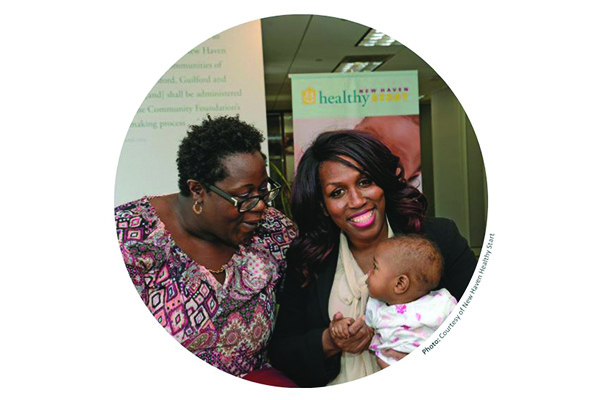From the Start: New Haven Healthy Start
Since 1997, the New Haven Healthy Start has worked hard to reduce the infant mortality and morbidity rate in the City of New Haven.
 |
The New Haven Healthy Start consortium meets throughout the year to discuss maternal health and access to care. Photo Kathleen Cei. |
Back in the mid-1980s, the infant mortality rate for African American babies in New Haven was higher than in many underdeveloped countries, mirroring the nation's infant mortality crisis. There were 20 deaths per thousand births in New Haven and a rate of 31 deaths per thousand births for New Haven African Americans. Black babies were dying at 2½ times the rate of White infants. The data prompted a citywide call to action. The Community Foundation for Greater New Haven convened leaders and public health experts to form The Commission on Child and Infant Health.
After convening the Commission, The Community Foundation applied for federal funding to start New Haven Healthy Start (NHHS). Since receiving its first grant in 1997, The Foundation has secured over $22 million to administer the New Haven Healthy Start and remains the only community foundation in the U.S. to administer a Healthy Start program.
From the start, the NHHS program has worked hard to reduce the infant mortality and morbidity rate in the City of New Haven. And the work has paid off. Women who are involved in NHHS have better birth outcomes than those who are not. NHHS program participants also continue to experience better birth outcomes compared to women in similar cities throughout Connecticut.
Still, there is opportunity for improvement. Studies show rates of 7 deaths per thousand births in New Haven overall. By comparison, the state average is 5 per 1,000 and the Federal Government's Healthy People 2020 target is 6 per 1,000 births.
Many risk factors can affect birth outcomes. Low birth weight is the leading cause of infant mortality and it increases the risk of fetal and infant death as well as chronic health conditions.
Advocates and researchers have tied poor birth outcomes to several factors including smoking, substance abuse, poor nutrition, lack of prenatal care, medical problems, chronic illness, sudden infant death syndrome (SIDS), and the stresses of daily life, including racism. While many of these factors disproportionately affect poor women, racism affects African American women across the socio-economic spectrum. Where an individual lives also affects their health. New Haven Healthy Start works through a consortium of partners, community-based organizations and program participants to address the root causes of racial disparities in birth outcomes and enhance family resiliency. Over the years, NHHS has expanded from working with the city's hospitals and health centers to include homeless shelters and the city's housing authority. It strengthens the entire system for pregnant women and new mothers by addressing gaps in the delivery of prenatal and postnatal care and places an emphasis on addressing social determinants of health.
The Healthy Start Program raises awareness and elevates participant voices about the barriers to maternal health and wellbeing through its Women's Consortium, which meets regularly throughout the year. NHHS also works to increase father engagement and cultivate more services for men and fathers through a Men's Consortium.
Did you know?
The infant mortality rate for African American families is 2 ½ times higher than it is for White families. Source: NHHS
This article is part of a series of stories celebrating The Community Foundation's 90th Anniversary.
